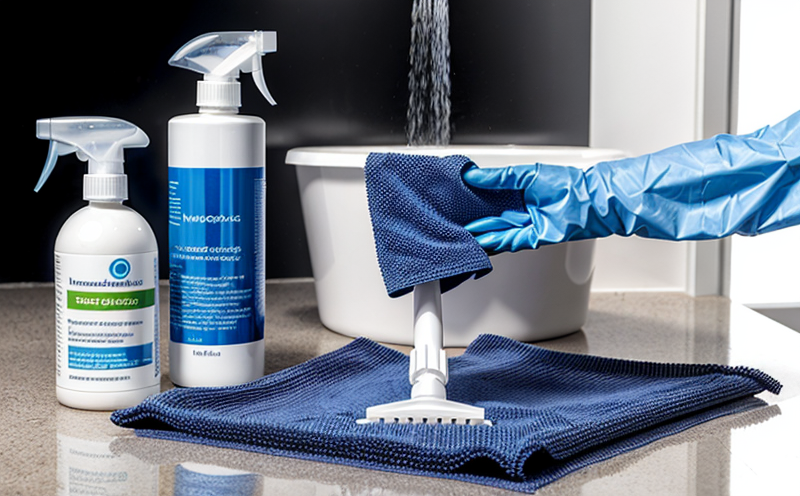DIN EN 13697 Surface Disinfectant Testing with Nanomaterials
The DIN EN 13697 standard is a pivotal framework for evaluating surface disinfectants, ensuring their efficacy against microorganisms. This service focuses on testing nanomaterial-based formulations to confirm they meet stringent standards for killing pathogens like bacteria and viruses.
Nanotechnology in cleaning products has gained significant traction due to its potential to enhance the efficiency of disinfection processes. Nanomaterials can be engineered with specific properties that allow them to interact more effectively with microorganisms, thereby improving the overall efficacy of disinfectants. However, these nanomaterials must undergo rigorous testing to ensure they are safe and effective for use in cleaning applications.
DIN EN 13697 specifies a series of tests designed to assess whether a surface disinfectant containing nanomaterials can achieve the claimed level of microbial reduction within specified time frames. The standard covers various aspects, including:
- Microbiological testing for efficacy against specific pathogens
- Safety evaluations ensuring biocompatibility and environmental impact
- Potential irritation tests on human skin and eyes
- Eco-labeling criteria for sustainable products
The testing process involves preparing the disinfectant according to manufacturer specifications, applying it to a standardized specimen, incubating it under controlled conditions, and then assessing the reduction in microbial load. The nanomaterials are evaluated not just for their efficacy but also for any potential adverse effects they might have on human health or the environment.
For instance, silver nanoparticles are often used in disinfectants due to their antimicrobial properties. However, these particles must be tested to ensure they do not release harmful by-products into the environment. The testing process is meticulous and involves multiple iterations to ensure reliability and accuracy of results.
The standard also emphasizes the importance of traceability throughout the supply chain. This means that each batch of nanomaterials used in the disinfectant must be tracked from production to final application, ensuring consistency and quality control. The testing process is designed to identify any inconsistencies or issues early on, allowing for corrective measures to be implemented.
Customer impact and satisfaction are paramount considerations in this service. By ensuring compliance with DIN EN 13697, manufacturers can rest assured that their products meet the highest standards of efficacy and safety. This not only enhances customer trust but also opens doors to international markets where stringent regulations are in place.
The testing process is complex and involves a range of specialized equipment, including microbiological incubators, pH meters, and UV spectrophotometers. The results are detailed in comprehensive reports that provide insights into the performance of the nanomaterials under various conditions. These reports are essential for quality managers and compliance officers to make informed decisions about product development and marketing.
In summary, DIN EN 13697 is a crucial standard for ensuring the safety and efficacy of nanomaterial-based disinfectants. This service provides a detailed evaluation process that covers all aspects of the testing, from sample preparation to final reporting. By adhering to this standard, manufacturers can ensure their products meet international standards and are safe for use in cleaning applications.
Customer Impact and Satisfaction
The success of this service lies in its ability to provide customers with reliable data that supports decision-making processes. Quality managers can use the results to ensure their products meet regulatory requirements, while compliance officers benefit from having comprehensive reports that justify product safety. R&D engineers gain valuable insights into the performance of nanomaterials under various conditions, which is crucial for continuous improvement.
The service also contributes significantly to customer satisfaction by ensuring that only high-quality products reach the market. This builds trust among consumers and enhances brand reputation, leading to increased sales and market share. By meeting international standards, manufacturers can confidently enter new markets with confidence in their product's performance and safety.
Moreover, the detailed reports generated from this testing process are instrumental for procurement departments. They provide a clear understanding of the quality and reliability of suppliers, enabling informed purchasing decisions that align with corporate sustainability goals.
International Acceptance and Recognition
- DIN EN 13697 is widely recognized in Europe and other regions for its stringent requirements on nanomaterials in disinfectants.
- The standard has been adopted by several countries, including Germany, France, the United Kingdom, and others.
- It ensures that products meet global standards of safety and efficacy, facilitating international trade.
The acceptance of this standard is crucial for manufacturers aiming to export their products globally. By adhering to DIN EN 13697, they demonstrate a commitment to quality and compliance with international norms, which is essential in today's interconnected market environment.
Recognition from authoritative bodies further strengthens the credibility of this service. The International Organization for Standardization (ISO) and European Committee for Standardization (CEN) have played significant roles in promoting standards like DIN EN 13697, ensuring they are respected worldwide.
Environmental and Sustainability Contributions
The testing process under DIN EN 13697 not only ensures the safety and efficacy of nanomaterials but also contributes positively to environmental sustainability. By evaluating the potential impact on ecosystems, this service helps manufacturers develop products that are less harmful to the environment.
Manufacturers can use the insights gained from testing to innovate and improve their products further. This includes exploring more sustainable alternatives for packaging, reducing waste, and minimizing the carbon footprint of production processes. The comprehensive reports generated by this service provide a roadmap for continuous improvement in sustainability practices.
In conclusion, DIN EN 13697 plays a vital role in ensuring that nanomaterials in cleaning products are not only effective but also safe and sustainable. This service is essential for manufacturers looking to meet international standards and contribute positively to environmental protection.





